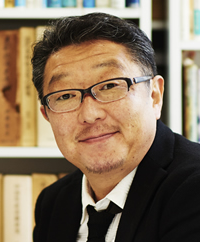Our Center has held numerous symposiums and exhibitions to date, published books and presented papers, with all our members striving to make Edo-Tokyo Studies a new brand of Hosei University. And now, the Center is gradually becoming a base for a diverse range of people to connect, interact and create together.
Next, we will continue to challenge ourselves in various fields such as history, history of art, geography, sociology, urban architectural studies and environmental studies in our aim to establish <New Edo-Tokyo Studies> so that its perspectives and methods are full of innovation. The Center was established through a collaboration between the Research Center for International Japanese Studies in the humanities, and the Laboratory of Regional Design and Ecology in the sciences. In particular, we will make use of this strength to elucidate a focus from two aspects: a historical, artistic and social perspective, as well as an architectural, geographical and spatial one, in ways that show both solid forms and generality.

Third Director of the Research Center for Edo-Tokyo Studies
Takamura Masahiko
The process of transcending the frameworks of previous scholarship and advancing research in this way has incited more interest than ever before in what the characteristics of Edo-Tokyo might be. So, while we have actively carried out comparative research with overseas in diverse fields on the theme of “city” and announced new results in Edo-Tokyo Studies, the topic has also risen of our uncovering that uniqueness ourselves from an objective viewpoint. By positioning and sharpening that discovered viewpoint at the center of the research framework, we are attempting to create a base for progressing to the next stage once more.
Learning about the diversity of worldwide cultures and searching for possibilities amid extensive globalization, which will enable the Research Center for Edo-Tokyo Studies to contribute to sustainable development in the world, is precisely our goal. Today we see a sharp decline in population and the arrival of an aging society mainly in developed countries including Japan, and a great turnaround in values is needed relating to the previous way of rapid growth-type, development-oriented cities. Moreover, in addition to the issue of the environment on a global scale, there are questions about the human stance in the face of disaster and disease. In natural disasters such as the Great East Japan Earthquake, and the COVID-19 pandemic, we seek an ideology that is different to that of the 20th century, when, although a matter of course to consider human life first, there was overconfidence in the power of technology and economies to bring it completely under control. By knowing, even when encountering unforeseen difficulties, that there are limits in trying to solve them by sheer strength, and by accepting and coexisting with them where possible with more humility, once they are overcome, we can set wisdom and ideas to work in anticipation of the revival of society that is certain to come. How can we make the hindered opportunities and time that we have been given into something valuable for the future? We in the 21st century are now living at a huge turning point regarding such ideology.
Of course, as before, we will not forget to consider positively the role achieved in our small, immediate community. Fundamental research in order to display endemic cultural strength in the face of advancing globalization is a constantly essential theme. The Research Center for Edo-Tokyo Studies aims to be a research organization open to the world, at the same time as to society, and to the local community.
Using the strength of progressing in collaborative research in the humanities and sciences, our goal is set to elucidate the special character of Edo-Tokyo from the two aspects of society and space, and to establish <New Edo-Tokyo Studies>.